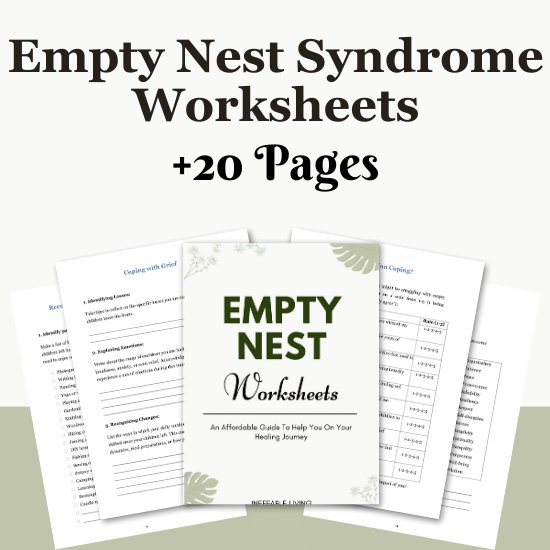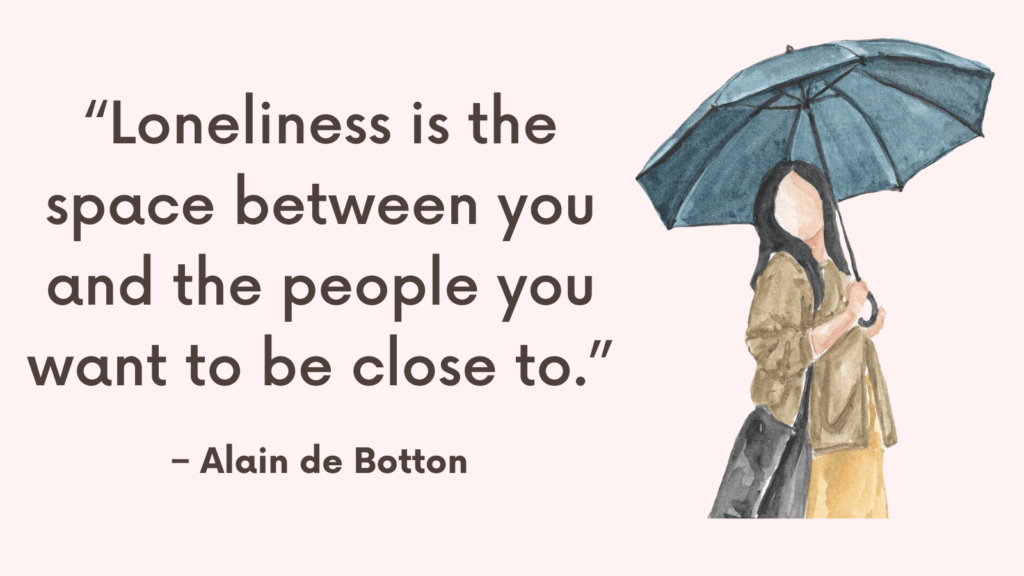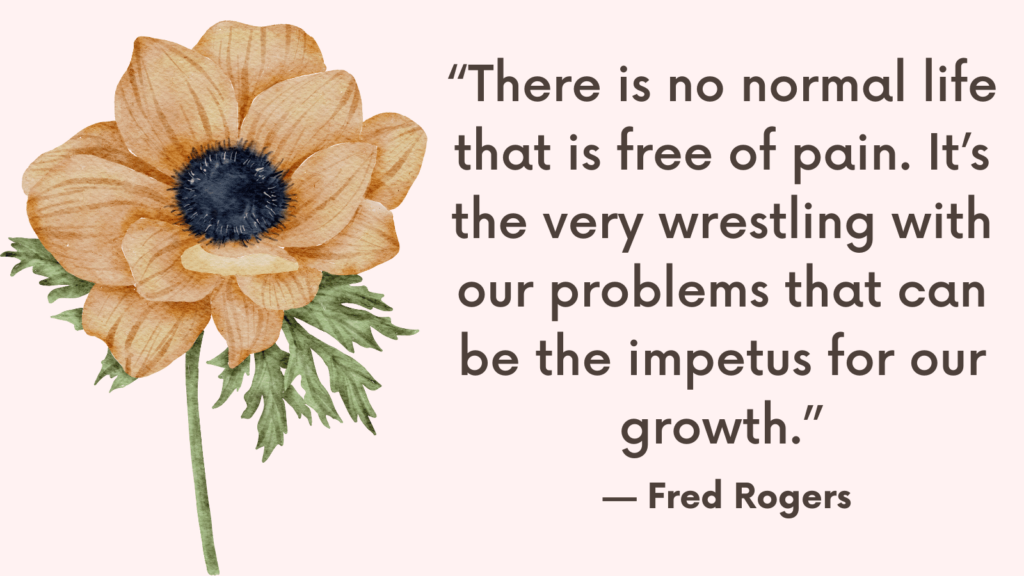In this post, you’re going to learn how to make friends as an empty nester.
What Is Empty Nest Syndrome?
Empty Nest Syndrome is a psychological phenomenon that can affect parents, typically mothers, when their children leave home to live independently.
This stage of life, often occurring in middle age or later, can bring about feelings of sadness, loss, and a sense of purposelessness as parents navigate the transition from actively raising their children to adjusting to an empty household.
It is important to note that not all parents experience Empty Nest Syndrome, and the intensity and duration of its effects can vary widely among individuals.
Signs of Empty Nest Syndrome?
Empty Nest Syndrome can be characterized by a range of emotional, social, and psychological symptoms, including:
1. Feelings of Loss and Grief: Parents may experience a profound sense of loss as they come to terms with the absence of their children in the home. This loss encompasses the physical presence of the children as well as the roles and routines associated with parenting.
2. Emotional Distress: Individuals may experience heightened feelings of sadness, loneliness, and even depression as they adjust to the changes in their daily life and grapple with a perceived void left by their children’s departure.
3. Shift in Identity: For many parents, a significant part of their identity and purpose has been tied to raising and nurturing their children. The departure of their children can lead to a reevaluation of self-identity and a search for new sources of fulfillment and meaning.
4. Relationship Changes: The absence of children in the home can lead to shifts in the dynamics of marital relationships. Couples may need to renegotiate their roles and find new ways to connect and support each other as they adapt to this new phase of life.
5. Existential Concerns: Parents may grapple with existential questions about their place in the world, their future aspirations, and the legacy they wish to leave behind as they enter a stage that marks a significant departure from their role as primary caregivers.
Related: Toxic Mother Daughter Relationship Quiz (+FREE Worksheets)
How to Make Friends as an Empty Nester?
As an empty nester, the transition to a stage of life where your children have grown and left the home can bring about significant changes and challenges, including in the realm of social connections.
Making friends during this phase can be a rewarding and enriching experience, and there are several strategies and approaches that can help facilitate the process.
1. Embrace Opportunities for Social Interaction:
Engaging in activities and hobbies that you enjoy can provide opportunities to connect with like-minded individuals.
Consider joining clubs, classes, or communities centered around your interests, whether it’s art, sports, cooking, or volunteering.
These environments can serve as natural settings for meeting new people and fostering friendships based on shared passions.
2. Attend Social Events and Gatherings:
Actively participating in social events and gatherings within your community or social circles can help expand your social network.
Whether it’s neighborhood gatherings, local meetups, or social outings organized by interest groups, these occasions present the chance to engage in conversations, share experiences, and establish meaningful connections.
3. Utilize Technology and Online Platforms:
Embracing technology can be a valuable avenue for connecting with others, especially in today’s digital age.
Consider exploring social media platforms, community websites, and online forums tailored to your interests or local area.
These platforms can serve as virtual spaces for initiating conversations, arranging meetups, and discovering social opportunities within your community.
Related: How to Deal with Toxic Adult Children? Top 9 Tips
4. Cultivate Existing Relationships:
While adjusting to the empty nest phase, it’s important to nurture and maintain existing relationships with family and friends.
Reaching out to old friends, planning reunions, and maintaining regular communication can help sustain meaningful connections and potentially lead to the development of new friendships through mutual contacts and introductions.
5. Pursue Personal Development and Learning:
Enrolling in courses, workshops, or educational programs can not only contribute to personal growth but also create opportunities to meet individuals with similar aspirations and intellectual pursuits.
Whether it’s learning a new language, acquiring a skill, or delving into academic interests, these environments can foster connections among individuals with shared curiosities.
6. Be Open to New Experiences and Interactions:
Approaching social situations with an open mind and a willingness to engage with diverse individuals can be instrumental in broadening your social circle.
Being open to new experiences, perspectives, and interactions can lead to meaningful encounters and the cultivation of friendships with people from varying backgrounds and life stages.
7. Host Social Gatherings:
Organizing social gatherings or informal get-togethers at your home can create opportunities for connecting with neighbors, acquaintances, and potential new friends.
Hosting events such as potlucks, game nights, or themed parties can foster a sense of camaraderie and provide an inviting atmosphere for building friendships in a relaxed setting.
8. Seek Support and Connection Through Support Groups:
Exploring support groups or community organizations specifically geared toward empty nesters and individuals in similar life stages can offer a supportive environment for sharing experiences, seeking advice, and forming meaningful bonds with those who understand the unique challenges and opportunities associated with this phase of life.
Related: Daughters Who Blame Their Mothers For Everything – Top 5 Tips On How To Deal With It
9. Foster Meaningful Conversations:
Engaging in genuine and meaningful conversations with others can lay the groundwork for establishing deep and lasting connections.
Actively listening, expressing empathy, and sharing personal experiences can create an atmosphere of trust and understanding, fostering the development of authentic friendships.
10. Practice Self-Compassion and Patience:
Embracing the process of making friends as an empty nester requires patience and self-compassion.
Recognize that building new relationships takes time and may involve stepping out of your comfort zone.
Being kind to yourself throughout this journey and celebrating small victories can contribute to a positive and resilient mindset as you navigate this transitional period in your social life.

Conclusion
Making friends as an empty nester involves openness, proactivity, and a willingness to explore various avenues for social connection.
By embracing opportunities for interaction, leveraging technology, nurturing existing relationships, and engaging in new experiences, you can cultivate a vibrant social life and form meaningful friendships that enrich this exciting new chapter in your life.


